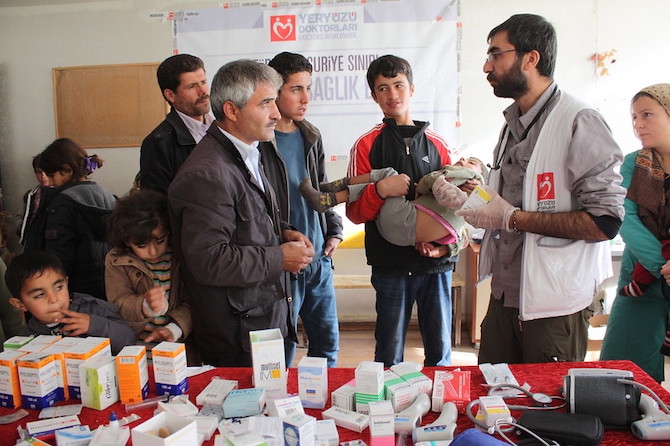by Bahar Baser, Ahmet Erdi Öztürk & Hakkı Taş

According to statistics released by the Turkish Medical Association 1,405 doctors left their jobs in Turkey to work abroad in 2021, and 197 more emigrated in January 2022 alone. That number is hard to swallow when compared with the previous years’ data. For instance, in 2012 only 59 specialist doctors left the country – a 2,206 percent increase in almost a decade. Furthermore, the number of vocational language courses, for doctors, in German and English has increased rapidly in big cities such as Istanbul, Izmir and Ankara, where Telegram groups have emerged to help each other apply for jobs abroad. The numbers are soaring despite the long, burdensome process of validating physician credentials in Europe. With little hope about the country’s future, low morale and frustration reigns among the remaining doctors. Systematic violence is another part of this multisided problem. Over the course of 2020, the Health Ministry recorded more than 11,000 acts of violence against medical professionals. Among those, over 2000 were for a combination of physical and verbal violence.
The political authorities of the country have long acted in wilful negligence. ‘Let them go, if they go,’ President Erdogan said about emigrating physicians, while only recently changing his tone in a sharp U-turn and stressing Turkey’s need for them. He has vowed to improve pay and impose stricter laws punishing violence against medical staff. It remains unclear whether these promises will be kept or even if they would suffice to incentivise doctors to stay. On the other hand, Western countries are hosting more and more foreign doctors. According to the German Medical Association, for instance, there were 56,107 foreign physicians among the 409,121 licensed physicians in Germany at the end of 2020, a four-fold increase over the last two decades.
Though on a lesser scale, the Turkish case is reminiscent of Venezuela, which underwent a four-year bout of hyperinflation until this year, driving prices out of control and reducing the minimum monthly wage to $1.50. In the 2010s, more than half of the country’s medical doctors fled due to the severe economic crisis and authoritarian downturn. Exacerbated by the drained supplies of medicine, this culminated in a humanitarian crisis, with Venezuelan health facilities losing 60 percent of their 2011 capacity by the end of the decade. On the other hand, countries such as Chile, Brazil, Argentina and Peru have exploited this wellspring of talent to strengthen their health services, particularly in rural areas.
The exodus of qualified health professionals is not an isolated occurrence, but rather reflects a full-scale brain drain, and a broader wave of long-term emigration. In the case of Venezuela, this led to the largest migration and refugee crisis on the continent, comprising now more than 5.9 million Venezuelan refugees and migrants worldwide – referred to as the ‘Bolivarian diaspora.’ With the economy, security and healthcare systems deteriorating, and political repression increasing after President Maduro’s 2017 self-coup (autogolpe), Venezuelan asylum claims tripled in 2018 and displacement increased fourfold since then.
In Romania, a similar phenomenon occurred, though with a different dynamic. During the decade following the country’s 2007 EU accession, 43,000 physicians migrated to Western Europe in search of a better life, resulting in severe staff shortages in their home country. Overall, 3.4 million Romanians emigrated in the same period. Yet, the drive persists. According to a recent study, 84.7 percent of Romanian medical students seek employment abroad after graduation, with many already planning their departure.
One may draw two lessons from these cases: doctors’ emigration eventually leads to severe deficiencies in healthcare services, a very important consequence of brain-drain. However, looking at the larger picture, this phenomenon cannot be isolated from the larger tide of emigration trends. The public debate has narrowly addressed the ongoing physician migration in relation to specific occupational problems such as violence against medical practitioners. We argue that perhaps we should treat this issue as the canary in the coal mine. Might these trends just point towards a larger impending wave of emigration?
White-collar workers – a highly-educated segment of Turkish society – are leaving the country or making plans to leave as soon as they get the opportunity. Doctors are not the first or even the main occupational group wanting to leave Turkey, and indeed there are many different elements of society that have been fleeing for various social, political and economic reasons. Turkey’s authoritarian turn, which started approximately after the Gezi Protests in 2013 and accelerated after the attempted coup in 2016, created a new wave of emigration, mostly towards Europe, as a result of undemocratic practices, economic uncertainties and societal polarisation. The new wave perfectly mirrors the situation of the groups considered the opposition to the ruling regime: fragmented, disappointed and multilayered. These groups, perhaps, would not associate together in Turkey, despite being in the opposition, but now find themselves sharing this new faith which foresees a new life outside the country in which they were born and raised. Many white-collar, highly educated, middle-class citizens, students, activists, non-Muslims, secularists, journalists, former politicians and former regime loyalists, among others, began leaving (or began considering to leave) to start a life outside Turkish borders both in the Global North and South, due to their life-style choices, future concerns and perceived lack of human security in Turkey. After the coup attempt, however, most of the migration decisions taken by migrants and asylum seekers were involuntary because of their fear of persecution, arrest and torture. For instance, in 2020 Turkey was ranked the 5th among list of countries with the highest number of asylum seekers filed in Europe. The approval rates for asylum applications indicate that the European countries also acknowledge the basis of those fears.
Involuntary emigration was accelerated after the coup attempt as a result of an immediate need to exit the country for survival. The second cohort of voluntary migrants, however, are telling us a different story. They had the time to digest the political, social and economic transitions that Turkey has been going through; they experienced the polarising political environment, assessed their economic situation and what might come in the future, and considered their children’s education and employment prospects. They arrived at an informed decision, aware of the risks they are taking. The departure of doctors became perhaps the most visible case thanks to media attention received at home and abroad. However, people from other sectors including the media, arts, and engineering (especially software engineers) are also migrating to other parts of the world, mostly the Global North, making brain drain an increasing problem for Turkey’s future – downplayed by political elites yet snowballing into an obvious issue that cannot be swept under the carpet. The statistics, which show that emigration rates have increased by up to 100%, are just the tip of the iceberg. Voluntary migrants’ cost-benefit analysis means they wait for the ripe moment to act on their decisions. The statistics represent those who made it, however there are thousands more currently residing in Turkey making plans to leave one way or another at the first opportunity. The Turkish Statistical Institute identified that most of the people who leave are between 25 and 29 years old. Recently conducted surveys show that 73% of young people in Turkey want to live abroad.
Researchers refer to this new wave, which started with the Gezi protests, as a new milestone in the history of Turkish migration. Unlike the bilateral agreements which paved the way for guest worker schemes (which became permanent over time), or military coups that created shock waves for a specific period of time; this new wave has been ongoing for the last decade. It is affected by a variety of factors that have to do with democratic backsliding, economic crises and contentious politics in Turkey. Those who have the luxury to make a choice are leaving to test the waters and their departure might be temporary or permanent – only time will tell. What is striking is that the political authorities do not take the necessary measures to keep these people in the country by creating incentives or ameliorating the political, economic and social environment. The long-term consequences of such brain drain is yet to be seen but we have other examples to look at how human capital crisis can affect a country deeply if no measures are taken.







2 Comments